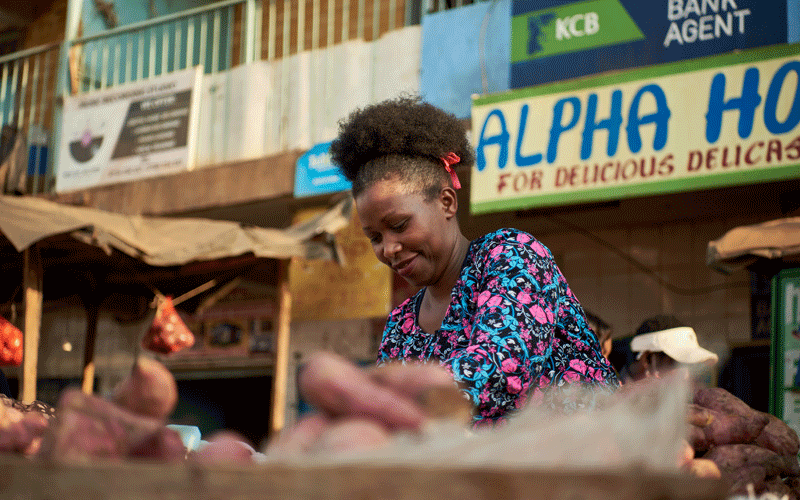Why I chose to have my breast cut off

For Lucy Njeri, the decision between an increased chance of death and living with only one breast was an easy one to make.
Lucy Njeri vividly recalls the horrors she underwent on the day she received the test results showing she had breast cancer.
“It took me by surprise,” Lucy says. “Emotionally, I went down. I tried to clear my tears, since I was still in the office, but immediately I left the gate, I broke down and cried. I was all by myself. I was not ready for it.”
The result indicated she had ductal carcinoma (cancer that starts in cells that line the milk ducts), grade 1.
The news hit her like a ton of bricks. And so she sat at the gate to her workplace, wrapped in colossal agony, struggling to come to terms with her new, sorry predicament.
She was still nursing emotional bruises sustained by her mother’s lengthy battle with throat cancer.
Now here she was, physically sick from a similarly debilitating malady.
Just then, a complete stranger, touched by the sight of a lonesome lady crying her heart out, approached to help.
“This passer-by tapped my back and asked me, ‘is it okay’? I shook my head, and gave her my results. 
She read and told me it was going to be okay. She asked if she could call my mum.
I told her no, she cannot call anyone in my family, since everyone was sick emotionally,” she explains.
Thus had begun Lucy’s long battle with breast cancer, a journey which, for many people, is beset with uncertainties and excruciating consequences on a person’s material and emotional well being.
For Lucy at least, she had a shoulder to lean on right from the onset, and this assuaged pangs of grief that had belligerently gripped the mother of three on that fateful day.
Lucy’s newly found comforter cut short her journey, offered to buy her a meal and they walked to a nearby restaurant.
But Lucy couldn’t eat. She cried her heart out the whole afternoon. She later gave the Samaritan the phone contact of one of her relatives, who came to pick her up.
“At night, I could not digest what I had read”, Lucy narrates, fighting back tears.
“The next thing in my mind was committing suicide. I had seen anguish and pain my mum was going through. I was not ready for it.”
As luck would have it, Lucy wouldn’t hang herself that night. She didn’t find a place to hang herself in the house.
But she cried the whole night. On waking up the next morning, her uncle candidly advised her to brace for the new reality.
It was time to summon her inner strength, and face her condition head-on.
“My uncle told me to face the lion, and fight it,” she adds. The words served to buoy her through the turmoil.
But another calamity lay ahead – nurses were on strike, and her hospital couldn’t take her in.
Her doctor advised her to seek surgery elsewhere. After weighing her options, Lucy settled on Kenyatta National Hospital, where she was booked for surgery.
“I had my breast removed,” she says.
Just before the mastectomy, a medic had counselled Lucy to be positive about the consequences.
There are people without breasts out there, the medic told her. They are surviving, and they’re okay. So, there is nothing to worry about. Life has to go on.
With these words, Lucy mustered the courage to go through it. And she bubbles with joy, noting hers was a choice between living with one breast or dying to maintain the image. She chose life.
“I have seen people who resist treatment, who say their breast(s) cannot be removed, and we lose them.
I’d rather not have the breast, and be alive. I am lucky to have one. I have seen people who don’t have both, and they’re still there.
Since then, I look at life from a different perspective”.
Thankfully, Lucy’s NHIF covered her treatment. This included six chemotherapies, radiotherapy, follow-up treatment and hormonal therapy.
Constant support
This was a tough time for Lucy’s three children, who underwent manifold emotional excursions in these trying moments.
They wondered at spike in visitors to their home. They’d been told their mother was sick, but couldn’t quite relate with the sickness.
Lucy requested help from a friend who broke down the news to her children, while assuring them that mum would be okay.
She recalls the news was particularly devastating to her daughter.
Now a fully recovered and ebullient cancer survivor, Lucy recounts her journey through the malaise with appreciation for galaxy of magnanimous supporters who held her hand through the predicament.
Right from the benevolent stranger who took her time to comfort Lucy in her low moments at the gate, to her circle of friends that helped her raise money for biopsy, her relatives, her husband and children, and neighbours, some of who would do her laundry, look after her children and even provided foodstuff and paid house rent in the bleak moments.
There was even a matatu crew that would wait for her early in the morning on the days she went for treatment.
And of tremendous importance to her journey, have been the healthcare providers who handled her condition.
“There are people you can’t even pay,” Lucy says. “I got a lot of help from neighbours and friends and even strangers.”
Her journey encapsulates the importance of a support network in the healing process of a breast cancer patient.
As the world celebrates the Breast Cancer Awareness month, a call is made upon everyone to lend a helping hand and a supportive shoulder for those caught up in the throes of this exacting malady, a malady that deals long-lasting blows on the purses and hearts of hundreds of households it afflicts.


